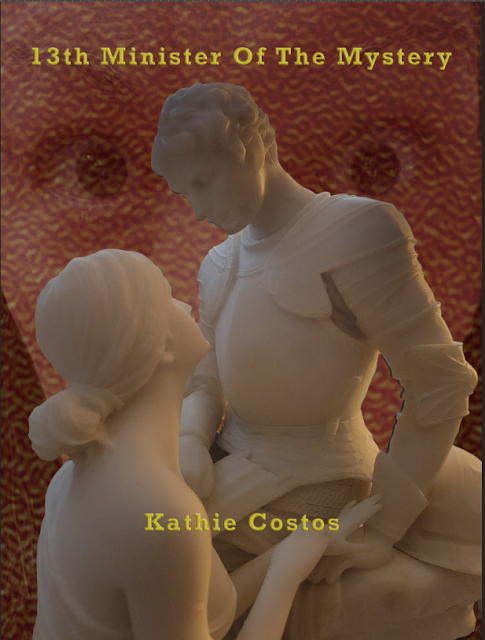Wounded Times
Kathie Costos
August 2, 2022
Get over it! It's all in your head! You're mentally weak! No one wants to hear about it! You should be ashamed of yourself if you let it get to you! It's time to move on! Don't be such a baby! You can't have PTSD because you're not a veteran!
How many times have you heard a boat load of crap after you survived something that could have killed you, coming out of the mouths of people when their worst problem is someone got their order wrong at McDonald's? Don't expect them to understand and don't expect the media to tell you the truth. It's gotten to the point where I'm impressed when a report actually covers #PTSD in non-veterans. That's pretty sad.
As a fellow survivor, researcher, and advocate, I've heard all the stuff for four decades and I'm sick and tired of it because it keeps getting repeated. What doesn't get repeated often enough is the truth. The only way to get the truth into the minds of those needing to hear it is to expose the lies.
Let's start with the biggest lie of all.
You can't have PTSD because you're not a veteran!
The truth is, the rest of us know that surviving traumatic events produces residual effects because Vietnam veterans returned from combat and forced the government to research it and add it to the disabilities they compensate for. It never goes away but because of research, we know that it does not have to retain power over the rest of our lives as survivors.
Other jobs cause PTSD because of traumatic events piling onto what the jobs caused while living as a citizen. Civilians get PTSD from every traumatic event responders respond to but the responders cannot see that fact.
The truth is, no matter what caused it, survivors of trauma can end up in the PTSD club no one wants to join, even from just one event. It isn't how many events we escape. It is the one that caused the demon of PTSD to penetrate.
Non-survivors don't get it, because the only way to enter into the world of PTSD is as a survivor. When they tell you what they think, it is based on their usual lives. Survivors live with the unusualness of seeing their sense of life as they knew it becomes a foreign land of unknowns.
They want to "fix" you by saying what they think you need to hear about what they think you need to do. They don't know common sense no longer applies because what you're living with, what hitched a ride in your life, is far from common.
When you hear there is no cure for PTSD, which is true, if you settle for that, then there is no hope of a better life. Yet, when they tell you you do have power over the rest of your life, that clues you in on the simple, basic facts, that life can become a lot better and happier than it is at your worst moments.
Common sense then becomes empowerment because you are aware of all the treatments, therapies, and support groups that came into existence did so because more people were not willing to settle for suffering as survivors instead of enjoying as such. When you realize the power within you began after your power was taken away by the event or the people that caused you harm, were defeated, you feel like a survivor. No apology is ever warranted because you lived through something others did not.
When I started writing
The Lost Son Alive Again series, I was angered by what I was reading being passed off as something worth reading. I kept wondering where were the facts. Where were reports that managed to inspire empowerment? So I wrote them in the lives of the characters' real survivors inspired.
Last night while working on the third part of the series, I wrote about one of the main characters. Her name is Grace and she survived the Pulse massacre, not as an attendee, but as a police officer responding to it. She was healed enough to live a productive life as a retired officer, turned Chaplain, and leader of a group dedicated to helping others heal.
She was being haunted by her memories and something that was trapped within them and talking to a therapist, who was also her friend.
Grace was on the Zoom call with Dariana. She was wiping her eyes, “But I don’t understand. I thought when you read the records from my other therapist, I wouldn’t have to talk about all of it again.”
“That’s right but this is something she never got you to talk about. If you’re willing, we may be able to figure out what still has a hold on your mind. Are you willing?”
“Yes. I know I have to.”
“Do you want to?”
“No. I don’t want to go through this but I know it’s the only way of putting the past in the past.”
“Ok. Close your eyes or get up and walk around so that I can hear you. You don’t have to be looking at me if you get uncomfortable.”
“Ok. I’ll start and then go with what takes some pressure off. I forgot about where we left off the night of the blizzard.”
“You’re Mom heard gunshots, called the police, and told you to put your snowsuit on. What happened after that?”
“She got her coat and boots on, got the flashlight, and was looking for a key. She was frantically searching for it and found it. It must have been to our neighbor’s house. She picked me up and put me on her back because the snow was too deep. She tripped a couple of times but made it up the stairs. She knocked and called out Sarah but no one answered the door. She used the key, opened the door, and told me to sit on the floor facing the door and she didn’t want me to move. Right after that, the power came back on.”
“Did you listen to her or did you follow her?”
“I listened to her until she called me to go to her.” She started to cry, got up, and walked around.
“Where was she?”
“She was in the kitchen on the floor with Kevin.” Grace stopped walking, “Oh my God! Sarah was dead! I had to walk by her! There was blood all over the floor and I slipped.” Grace put her arms around her waist and hunched her back.
Dariana waited, watching Grace, giving her time, and then called out her name. "Grace. What did you see?”
“My Mom was down on the floor with Kevin. She was trying to help him. She needed to call the police again but she had to stay with him. She told me to get the phone as close to her as I could and call them for her. She shouted at them and told them that if they didn’t get there soon Kevin was going to die.”
“Did they come?”
“After a while, yes. They had to park way down the next street because our street hadn’t been plowed yet. Kevin looked at one of the officers and said his Mom shot him. And then, he died.”
“What happened after that?”
“They did what they could. Two other officers came and took over. They walked me and my Mom back to our house. One of them carried me.”
“Do you remember anything else?”
“No.”
“Ok, you said you didn’t have your boots on. What was on your feet?”
“I don’t know. I had on heavy socks because it was so cold in the house. Why?”
“Grace, what did you look at when the officer was carrying you out the door?”
“Nothing.”
Dariana let her think about it. “Are you sure? You didn’t see anything in their house? Did you see Sarah?”
“Oh my God! Yes. And then I saw my bloody footprints!”
“Ok. Let’s get you back in your house. What happened after that?”
“My Mom had me up on the counter, took off my socks, and threw them away. She washed my feet and told me to forget all about what I saw that night.”
“Did your Dad come home soon after that?”
“The next day. He was yelling at my Mom. I never heard him yell at her before. She told him that he knew what she was like when they got married and as a nurse, she had to do something or wouldn’t be able to forgive herself for not trying. He understood and hugged her afterward.”
“What about Kevin’s Dad?”
“He moved out a couple of days later and never came back. My parents never talked about it after that.”
“And now you found the key. That was all still buried in your mind. When Pulse happened, I remember you said that there was so much blood, your boots were soaked and even your socks were covered with blood. That’s a lot to take without ever having therapy or being able to talk to someone about any of it. I’m amazed you were as together as you were all that time.”
“So this is why it all came back? You’re right. I never really got past any of it because of how it all started. I guess seeing Chris shot and blood on my shoes was more than I could take.”
“Yes and now you can take power away from it. Back when it happened, most people didn’t know what traumatic events like that did, especially to little children. Did your Mom change at all after that?”
“Once in a while, I’d see her looking out the window at their house and she cried a little. Mostly when it snowed. I heard her talking to my Dad and she said something about everything she saw as a nurse in the Air Force, that was the hardest one of all to get through.”
“How long did you live there after that?”
“My Dad got transferred to Florida the next year and we moved there. He said it never snowed in Florida and we could have a fresh start.”
“How did you end up in Salem and meeting Chris?”
“He was a Colonel by then and was back at Hanscom. When he retired he had a great job in Boston and we didn’t have to move anymore. That was when I met Chris and he cared so much about me that I found my best friend and my first love.”
“And the rest I know. I also know that if you got through all that, on top of when you were taking care of Pam and Rose, you are a very strong woman and have a very rare soul. It also proves that you know when to ask for help when you need it and you’ll be a lot happier now without all that weighing on your memories.”
“You know, I think you’re right. It all fits now. Thank you!” She laughed. “You know, when Chris said you were a genius at getting people to remember what they didn’t want to, he was right. You are.”
“That’s my job, plus I know a little bit about how you were feeling. I was the one that found my Dad after he committed suicide. I was older, but still, I was only sixteen. My Mom and he separated and I went to clean his apartment for him. He had been dead for two days and it always haunted me that he would choose death over talking to someone. I have to keep reminding myself that back then, no one was talking about what they were going through because they couldn’t understand it either.”
“So now you give them a safe place to talk and can read them enough to know what they’re trying to hide.”
“It’s not so much what you or they are trying to hide, it is more a matter of something that is hiding in their memories and trying to get out. Are you ok now or do you want to talk some more?”
“I’m ok and thank you.”
“You’re welcome and we should still catch up tomorrow a the same time and then you can decide if you need me more or not.”
“That’ll be good. Thank you so much! Have a good night.”
And that's how the main character healed. He was a reporter, yet veterans helped him heal. He had a wonderful childhood with loving parents, yet survivors of child abuse helped him heal. He was a survivor of domestic abuse and violence as a husband inflicted by his first wife, yet a woman that survived what her husband did to her, helped him heal. He was not gay, but a gay female ex-wrestler helped him learn how to fight to take back power over his life. He was not a police officer, but one helped him heal and opened his heart again. He walked away from God, yet an ex-priest helped him heal and find God again.
None of them knew what it was like to be Chris, but they all understood what surviving did to him as much as they knew what he needed to heal his life.
I didn't serve yet worked with veterans and their families because I understood what it did to them. One day, I had a veteran challenge me saying I didn't know what I was talking about because I wasn't a veteran. He turned it into a contest. So, I listed everything I survived. I asked him if he survived any of them. He said he didn't. Then I asked him if he could understand what all that did to me. He said he did. That got him to open his eyes to the simple fact that survivors may not have lived through the same event, but we are all living with the results of surviving. The cool thing is, that most of us are more than willing to share the recovery so others can pass it on too!















